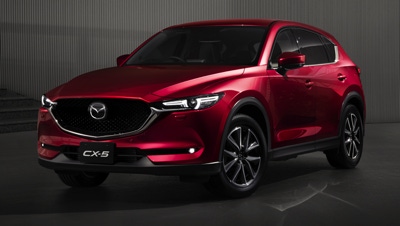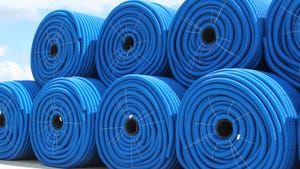Mazda teams with Mitsubishi Chemical to develop bio-based engineering plastic grade
The automaker adopts the non-biodegradable polycarbonate material in the front grill of its CX-5 model
December 7, 2017

Mitsubishi Chemical Corp. and Mazda have jointly developed a new grade of Durabio bio-derived polycarbonate engineering plastic suitable for molding large cosmetic automotive parts. Durabio is based partially on isosorbide, which in turn is derived from sorbitol, a widely available natural feedstock. Mazda has adopted the material for the front grill of its new CX-5 compact crossover. Previously, French automaker Renault adopted Durabio in the outer mask of the speedometer-tachometer combo used by the new generation Clio which was launched in June 2016.
|
The Mazda CX-5 is the first vehicle to employ Mitsubishi Chemical's Durabio bio-based polycarbonate resin in a large part. |
Durabio’s properties are engineering-like, with tensile modulus typically in the 2300–2700-MPa range, tensile strength ranging from 64–79 MPa, flexural modulus of 2100–2700 MPa, and flexural strength of 94–116 MPa. The material’s transparent nature also means it is highly colorable, with pigment dispersion in colored compounds of a level that obviates the need for painting. Further, impact strength and weatherability are said to be superior compared with 100% petroleum-derived engineering plastics, while high surface hardness imparts good scratch resistance.
Besides the two aforementioned applications, Mitsubishi Chemical reported successful application in various interior and exterior cosmetic auto parts, including pillars.
The latest grade developed by Mazda and Mitsubishi Chemical features improvements in resin composition to further improve its property balance with respect to impact strength, weatherability and processability, thereby enabling the molding of such a large part. Mazda plans to adopt the grade in future models while Mitsubishi Chemical intends to further development efforts directed at application of Durabio in large auto parts.
About the Author(s)
You May Also Like





